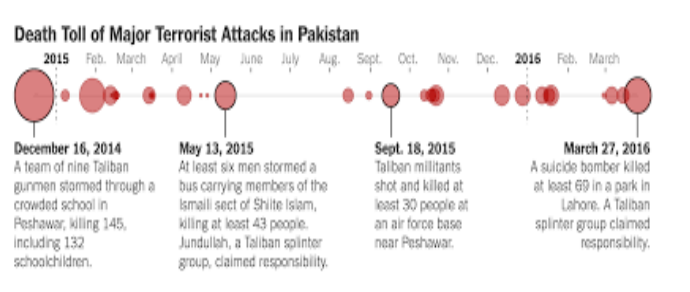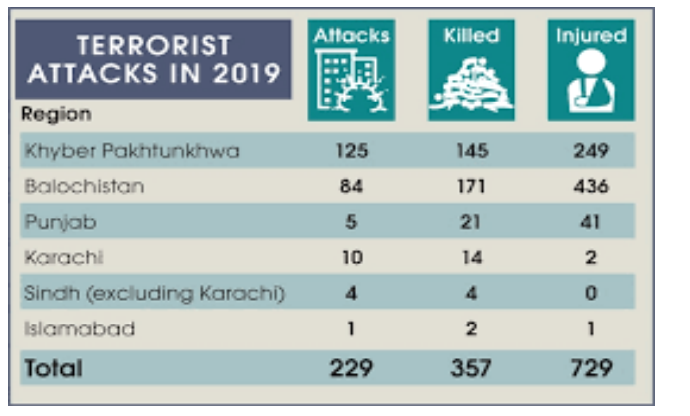The issue of terrorism in Pakistan has complex roots that stem from various
historical, social, political, and economic factors. some of Factors which
significant contribute in terrorism are given below:
- Historical Context: The partition of India in 1947 and the subsequent creation of Pakistan led to communal tensions and a struggle to establish a national identity. These tensions were further aggravated by subsequent wars with India, regional conflicts, and the separation of East Pakistan (now Bangladesh) in 1971. These historical factors created a sense of insecurity and resentment, which have influenced extremist ideologies in some segments of society.
- Soviet-Afghan War: The Soviet invasion of Afghanistan in 1979 had a profound impact on the region, including Pakistan. Pakistan, along with the United States and other countries, supported Afghan resistance fighters (Mujahideen) against the Soviets. During this period, Pakistan
became a base for training and arming the Mujahideen, with support from intelligence agencies, including the CIA. The influx of foreign fighters, weapons, and radical ideologies contributed to the growth of militant organizations within Pakistan. - Proxy Warfare: Following the Soviet withdrawal from Afghanistan in 1989, the militant groups that had been supported by Pakistan and other countries were left without a clear purpose. Many of these groups turned their focus towards Kashmir, a disputed region between India and
Pakistan. Pakistan’s intelligence agencies allegedly continued to provide support to some of these groups, leading to a proxy war with India. The militant organizations expanded their networks and established training camps within Pakistan, resulting in increased domestic militancy. Socio-Economic Factors: Pakistan faces significant socio-economic challenges, including poverty, inequality, lack of education, and unemployment. These issues have created fertile ground for
radicalization and recruitment by terrorist organizations. Disenfranchised individuals, particularly in marginalized communities, can be susceptible to extremist ideologies due to a lack of opportunities and a sense of hopelessness. - Sectarian Tensions: Pakistan has experienced sectarian violence between different sects within Islam, primarily between Sunni and Shia communities. Extremist groups have exploited these divisions and targeted religious minorities, contributing to the overall atmosphere of
insecurity and violence. - Geopolitical Factors: Pakistan’s strategic location, bordering Afghanistan and Iran, has made it a crucial player in regional geopolitics. The power vacuum left by the Soviet withdrawal from Afghanistan and subsequent conflicts in the region have had spillover effects on Pakistan. Militant groups took advantage of porous borders, weak governance, and ethnic and tribal tensions to establish safe havens and launch attacks.
Some Famous Terrorist Groups:
- Tehreek-e-Taliban Pakistan (TTP): The TTP is a militant group formed in 2007 as an alliance of various Pakistani Taliban factions. They aim to establish their interpretation of Islamic law in Pakistan. The TTP has been responsible for numerous suicide bombings, assassinations, and other
attacks targeting civilians, security forces, government institutions, and
religious minorities. - Balochistan Insurgency: Balochistan, the largest province of Pakistan, has witnessed a long-standing insurgency led by Baloch separatist groups. These groups demand greater autonomy or independence for Balochistan. The insurgency has resulted in attacks on security forces, government
installations, and infrastructure projects. - Sectarian Violence: Pakistan has also faced sectarian violence, primarily between Sunni and Shia communities. Extremist groups from both sects have targeted each other’s places of worship, religious processions, and influential figures, leading to significant loss of life and communal
tensions. - Foreign-backed Extremist Groups: Pakistan has faced threats from extremist groups with links to international terrorist organizations. In the past, groups like Al-Qaeda and the Haqqani Network have used Pakistani soil for planning and launching attacks both within Pakistan and abroad.
Steps to Counter Terrorism Taken by Pakistan:
- Operation within country: Pakistani government has taken significant steps to combat terrorism, including military operations, law enforcement efforts, and initiatives to counter radicalization. However, the deep-rooted nature of the problem requires a comprehensive approach that addresses the underlying causes, such as socio-economic development, education,
and addressing sectarian tensions, in addition to security measures. - Operation Zarb-e-Azb and Radd-ul-Fasaad: In response to the escalating terrorism, the Pakistani government launched major military operations to combat terrorism. Operation Zarb-e-Azb (2014) and its follow-up operation, Radd-ul-Fasaad (2017), aimed to eliminate terrorist
networks, disrupt their infrastructure, and restore peace and stability in the affected regions. - International Measures: Pakistan has taken steps to counter terrorism through legislative measures, intelligence sharing, and strengthening law enforcement agencies. The country has also collaborated with international partners, such as the United States, China, and Afghanistan, to combat terrorism and promote regional stability
Graphs of Terrorism Activities in Pakistan
Death Toll of Major Terrorist Attacks in Pakistan:

Terrorist Attacks in 2019:

Written by:
Wahab Alam
The Lex Blogger

